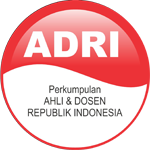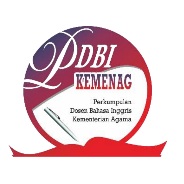Developing Speaking Skill through Opinion Expression Method in Islamic Higher Education Context
Abstract
Through the Opinion Expressions Method, this study seeks to improve students' speaking skill in the context of Islamic higher education. It was separated into two cycles and planned as a cooperative classroom action research project. Data were gathered throughout six speaking lesson meetings during the second semester's term from class observations, field notes, questionnaires, and speaking tests. 24 students participated in the study. Based on the specified success criteria, the researchers determined how well the students were developing their speaking skill. According to the results, 11 students (48%) failed the first cycle while 13 students (54%) successfully completed it. The researchers carried on to the following cycle because the students’ speaking skill had not yet met the standards for success. Some changes were made to address the shortcomings in the First cycle, including: requiring more direction in structuring sentences by posing and responding to questions based on the callings in the photos provided in groups; encouraging students to be active in group work; emphasizing the importance of having fair distribution of work among the participants; and explaining that the direction-giving process should be improved. In the second cycle, 19 students (79%) successfully gained it, while just 5 students (21%) failed. Finally, a fascinating implication of this research was that the Opinion Expressions Method may be used to improve students' speaking skill.
Keywords
Full Text:
PDFReferences
Aidinopoulou, V., & Sampson, D. G. (2017). An action research study from implementing the flipped classroom model in primary school history teaching and learning. Journal of Educational Technology & Society, 20(1), 237-247.
Allwright, D. and Bailey, K. M. (1991). Focus on the Language Classroom; An Introduction to Classroom research for language lecturers, Cambridge University Press.
Andi, K., & Arafah, B. (2017). Using needs analysis to develop English teaching materials in initial speaking skills for Indonesian college students of English. The Turkish Online Journal of Design, Art and Communication (TOJDAC), Special Edition, 419-436.
Bailey, K. M., & Nunan, D. (2005). Practical English language teaching: speaking.
Belhouchet, A., & Mezhoud, S. (2019). Enhancing students’ speaking skill through Role play and group discussion.
Bilen, S. (2021). Speaking as a musical expression tool according to teachers’ views. Cypriot Journal of Educational Sciences, 16(2), 869-887.
Brown, D.H. (2000). Teaching by Principles, An Interactive Approach to Language Pedagogy. San Fransisco State University.
Dewi, R. S., Kultsum, U., & Armadi, A. (2017). Using Communicative Games in Improving Students' Speaking Skills. English Language Teaching, 10(1), 63-71.
Finnochiro, M. and Brumfit, C. (1983). The Functional-Notional Approach; From Theory to practice. Newyork: Oxford.
Frazee, B.M. and Rudnitski, R.A. (2002). Integrated Teaching Methods: Theory, Classroom Applications, and field-based Connections. Delmar Publishers An International Thomson Publishing Company.
Harmer, J. (2001). The Practice of English Language Teaching, Pearson Education Limited.
Hussain, S. (2017). Teaching speaking skills in communication classroom. International Journal of Media, Journalism and Mass Communications, 3(3), 14-21.
Iman, J. N. (2017). Debate Instruction in EFL Classroom: Impacts on the Critical Thinking and Speaking Skill. International Journal of Instruction, 10(4), 87-108.
Johnson, K. (2001). An introduction to Foreign Language Learning and Teaching. Pearson Education Limited
Kemmis, S. and McTaggart R. (1988). The Action Rersearch Planner, Deakin University. Third Edition.
Krebt, D. M. (2017). The effectiveness of role play techniques in teaching speaking for EFL college students. Journal of Language Teaching and Research, 8(5), 863.
Leo, S. (2006). English For leisure Time Speaking; Jakarta: PT Gramedia Pustaka Utama.
Lou, R. (2008). The Hand Book of Basic Speaking skills: Jakarta, E Plus mobile English.
McDonough, J. and Shaw, C. (1993). Materials and Methods in ELT, Blackwell Publishing.
Mirra, N., Filipiak, D., & Garcia, A. (2015). Revolutionizing inquiry in urban English classrooms: Pursuing voice and justice through youth participatory action research. English Journal, 49-57.
Petersen, C., & Nassaji, H. (2016). Project-based learning through the eyes of teachers and students in adult ESL classrooms. Canadian Modern Language Review, 72(1), 13-39.
Richard, J.C. and Renandya, W. A. (2002). Methodology in language teaching: an anthology of current practice. Cambridge: Cambridge University Press.
Sagor, R. (1992). How to Conduct Collaborative Action Research, ASCD, Alexanderia, Virginia.
Sukur, S.G. (2008). Quick English: Easy and Communicative Speaking. Yogyakarta, Indonesiatera.
DOI: http://dx.doi.org/10.29240/ef.v8i1%20May.9850
Refbacks
- There are currently no refbacks.
Copyright (c) 2024 Ana Kuliahana, Abdul Gafur Marzuki, Rustam Rustam

This work is licensed under a Creative Commons Attribution-NonCommercial-ShareAlike 4.0 International License.
INDEXED BY:
 This work is licensed under a Creative Commons Attribution-NonCommercial-ShareAlike 4.0 International License
This work is licensed under a Creative Commons Attribution-NonCommercial-ShareAlike 4.0 International License
@ ENGLISH FRANCA : Academic Journal of English Language and Education
Jl. Dr. AK Gani No 1 Dusun Curup, Rejang Lebong Regency, Bengkulu Province, Indonesia, 39119.
Dr. Eka Apriani, M.Pd., email: efranca@iaincurup.ac.id, eka.apriani@iaincurup.ac.id.




.png)












